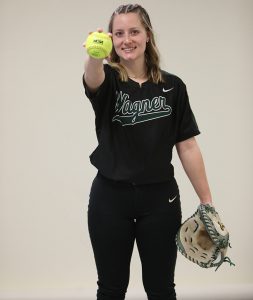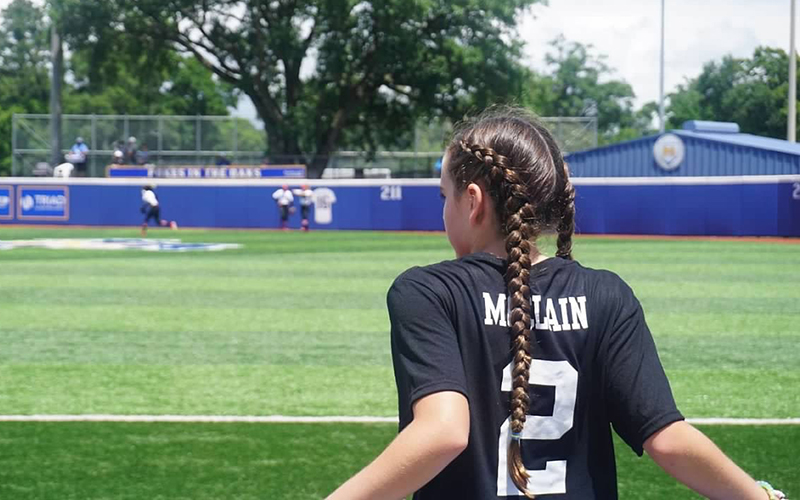
Arizona State’s Alberta B. Farrington Softball Stadium often draws a big crowd, but it has been empty this spring because of COVID-19. The decision to end college sports seasons has been a challenge for players at all levels. (Photo courtesy of Sun Devil Athletics)
PHOENIX – About this time eight years ago, Justyce McClain, a 15-year-old softball standout at Sandra Day O’Connor High School in north Phoenix, sealed her path to higher education with a verbal commitment to attend McNeese State University in Louisiana on a full-ride athletic scholarship.
Her sister, Syd Williams, who’s 12, aspires to follow in Justyce’s footsteps. But starting this season, an NCAA rule change prohibits recruiters from contacting prospects until they’re juniors in high school.
That actually lifted a big weight off the shoulders of Syd and her parents, who were happy their younger daughter would be able to play without any additional pressure.
“I love the new rules,” said Michelle Williams, mother to both Syd and Justyce. “It takes the pressure off of the girls and allows them to grow mentally and physically. It gives them the opportunity to enjoy the game without all the pressure at such a young age.”
But then the coronavirus pandemic hit, ending the season for tens of thousands of softball players in travel leagues, high school and college teams around the country.
The college softball season should be heating up by now, with the postseason underway and teams fighting to earn their way to Oklahoma City to vie for the national title. Yet softball’s best athletes and rising stars have had to stay home, along with the rest of the country.
Although they didn’t know it at the time, college athletes competed in their last game of the 2020 season months before it was supposed to end.
For young girls like Syd, that means putting their travel and high school teams on hold and focusing instead on training for softball’s unclear return.
College coaches can’t call, email or have any type of communication with the athletes they were courting for recruitment, and they’ve been left to decide whether to give scholarships to promising young freshmen or renew the scholarships of star senior athletes who will stay in college for a fifth year to play their final season in full.
That’s not an option for high school athletes. Some may have lost their last chance at being recruited, like athletes on assistant coach Kaylah Hampton’s varsity softball team at Verrado High School in Buckeye, who were hoping to play for area community colleges.
“This is it. Their senior year was stripped away from them,” Hampton said.
Face masks and gloves, staples of a catcher’s uniform, have now taken on a whole new meaning in wake of the highly contagious novel coronavirus and COVID-19, the deadly disease it causes.
Canceled season was a heartbreaker
March typically is a crucial month for teams trying to get into their groove as conference play approaches. In what was supposed to be any other preseason tournament, many athletes laced up their cleats and played their last game without even knowing it.
This was the case for Kyleigh Norris, a senior at Wagner College in New York. Her senior year finally would be her time to shine, as the previous three seasons she was unable to make her way into the starting lineup.
Coming into Wagner as a freshman in 2016, Norris was one of five catchers competing for a spot on the field. However, when she became an upperclassman, she dedicated all efforts into her offense and finally saw her name in the starting nine.
Norris was the designated player at the beginning of the 2020 season and made a statement in the first three tournaments, batting .500 and even hitting her first career home run.

Kyleigh Norris played her last softball game for Wagner College on March 8, nearly two months before the season was supposed to end. Although the NCAA has granted an extra year of eligibility to spring sport athletes, Norris chose to forgo another year of softball. (Photo courtesy of Kyleigh Norris)
But the ninth game of the 2020 season, against Hampton University on March 8, was the last for Norris and the Seahawks.
Norris, who has played for more than 15 years, remembers the game perfectly. She had continued her hitting streak, going 2 for 4. However, her last at-bat, she swung at the first pitch and popped the ball up to the catcher.
“Of course, at the beginning of the season, you brush off an at-bat like that, knowing you have a whole season to bounce back,” Norris said. “Little did I know, my softball career ended that day in Virginia.”
Norris said she was “completely heartbroken.”
“I remember sitting alongside about five of my senior teammates and just crying together because this is not how we imagined it ending,” she recalled.
The NCAA canceled the remainder of the 2020 season on March 12, leaving many athletes wondering whether they would be rewarded an additional year of eligibility. On March 30, the NCAA Division I Council, consisting of coaches and athletic directors from around the country, announced that athletes would be allowed to play a fifth season.
“The council’s decision gives individual schools the flexibility to make decisions at a campus level,” said Grace Calhoun, the chair of the council. Each program’s head coach has the final decision on honoring scholarship money to returning seniors despite an incoming freshman class in August.
Seniors now must decide whether to play a fifth year or move on to life without softball. Many athletes will choose not to take a fifth year.
Wagner College, for example, has eight seniors in the 2020 graduating class, and six have confirmed that they will not be returning in the fall. Most chose to pursue graduate programs they were accepted into months ago.
That includes Norris. To keep her connection to the sport she loves, she will attend graduate school at Eastern University in Pennsylvania next semester and serve as a graduate assistant coach for its softball team.
“Even though I will miss my team tremendously and the game of softball, I know it is my time to step away from the game I have loved since I was a little girl,” Norris said.
Olympic dreams benched
Erika Piancastelli was preparing to play on softball’s biggest stage in the 2020 Olympics in Tokyo. Instead, she’s contemplating summer in quarantine with her family in Italy.

In July 2019, Team Italy qualified for the 2020 Olympics in Tokyo. However, due to the coronavirus pandemic, the games have been postponed until 2021, forcing Erika Piancastelli and her teammates to find new ways of training during quarantine. (Photo courtesy of Erika Piancastelli)
As a member of Team Italy, Piancastelli was months away from living out her lifelong dream of representing her country as an Olympian.
The Olympics have officially been postponed to 2021, providing athletes another year to train. For Piancastelli, this means finding ways to play softball without access to a field, training facility or to her team and coaches.
“The biggest change would have to be the fact that it’s all done in my living room, which has never, ever been the case for me,” she said, referring to Italy’s strict stay-at-home rules. “Usually I’m either on a softball field or in a gym training, and now everything is done in my living room with very limited tools.”
To keep herself committed to training, Piancastelli posts her workouts on social media to encourage others to keep healthy habits during quarantine.
“Training from home has taught me a lot about myself and has allowed me to dig deeper and figure out more about who I am outside of softball,” she said.
For Piancastelli, Italy’s well being is her main concern, and she stresses the importance of following social distancing rules. Italy has the third highest number of deaths from coronavirus, nearly 32,000.
“It’s most important right now to focus on allowing our world to heal and get through this time. And then we can focus on training together again,” she said.
Impact on recruiting
Not only did the virus end the softball season, there’s also a hold on all recruiting. Coaches are unable to communicate with high school athletes until the NCAA announces the hold has been lifted, which means no emails, phone calls or visits.
Since the NCAA’s decision to grant an extra year of eligibility does not apply to high school athletes, those without an athletic scholarship are forced to wait and hope the hold is lifted before the start of the fall softball season in August.
For some of Hampton’s Verrado teammates, the dream of playing at the collegiate level was called out on strikes.
Hampton challenges the thought of working for something for more than 10 years – physically pushing through injury or illness, missing prom or football games – just to get the few innings to prove to college recruiters that you’re worth their scholarship.
Only 1.6% of high school softball players in the U.S. compete at the Division I level.
Additionally, current high school seniors who are already committed to a university will enter their first season of collegiate softball with a team that is likely to have far more girls than expected. With the NCAA’s decision to grant an extra year of eligibility, many softball programs will have their senior class returning for the 2020-21 season, which potentially increases a roster and decreases the amount of scholarship money to go around.
Alyssa Fernandez, recruiter and assistant coach at Phoenix College, said she understands the reasoning behind canceling the remainder of the season but worries how it will impact her team.
“We have almost all of our players returning, and for the freshman class coming in next year, it’s going to be challenging having so many players on one team,” she said.
There are more than 1,500 college softball teams in the nation, ranging from Division I to National Junior College Athletic Association, each left with major decisions to make for the athletes who choose to play additional season.
Implementing all these changes has been a logistical challenge, full of complications for coaches and athletes who are still left with many unanswered questions. For example, even though the NCAA has granted an extra year of eligibility, it hasn’t released any details as to how programs are going to be able to cope financially next season.
Saying goodbye to the sport
Jaymee Lawton, who played for Valparaiso University in Indiana before graduating in 2019, compared the emotional toll of the cancellation to a breakup you never saw coming.
“It really is like a relationship, but one that lasts for most athletes, for more than 15 years,” she said. “You fall in love with a game, you basically commit your whole life to it and you mentally have to prepare for the day it’s going to end and you have to get used to a life without the thing that honestly defined you for a majority of your life.”
Lawton said her favorite memory was the team’s Senior Day. She feels badly for current college athletes who trained their whole lives but never got to experience Senior Day and other traditional celebrations.
“As a senior last year, playing my last game was so emotional, but it was the way I wanted it to end with my parents there to watch on Senior Day,” she said.
“But for some of these girls who aren’t going to return for their fifth year, they played their last game without even knowing it. To some people that might not seem like a big deal, but it’s everything for an athlete.”
Players who decided against a fifth year are creating new ways to celebrate the end of their athletic careers.
The Norris family celebrated Kyleigh during quarantine on what would have been Senior Day on April 25. They held a Wagner College themed dinner, with Norris’ two sisters and parents dressed in softball jerseys with 16 on their backs. As Kyleigh walked down the stairs of their home in Toms River, New Jersey, the family stood with homemade signs and pictures from Norris’ softball journey.
“It wasn’t the Senior Day I had imagined, but it was with the exact people I wanted there most,” she said.
Not all college conferences are extending the opportunity to play for a fifth season. The Ivy League announced April 2 that it would not allow softball, baseball and lacrosse players another year to play.
“For girls who started this game at five years old,” Lawton said, “the game ended in the worst possible way, and many of them can’t do anything about it. That’s the worst part.”
Eager to get back on the diamond

Syd Williams, 12, has dreams of following in the footsteps of her sister, Justyce McClain, by becoming a Division I athlete. Syd hopes to play for the University of Oklahoma. (Photo courtesy of Michelle Williams)
Syd Williams has been following in sister Justyce’s footsteps since she was 5 and finally old enough to join T-ball. She hits left-handed, just like her sister, and mimics Justyce’s gameday hair with a perfect braid that falls to the bottom of the number on the back of her jersey, number 42, just like Justyce.
She continues to practice in the backyard with her built-in pitching mound and pop up batting net, which her dad built for her and Justyce when they first moved into the home.
Before quarantine, Syd practiced with her team nearly 10 hours a week, plus individual pitching and hitting lessons and tournaments every other weekend in Arizona and California. She was used to her fast-paced life of doing homework in the car on the way to practice and eating meals on the go as she traveled to and from practice.
Now, her days consist of homeschooling and private lessons with her coach, but with strict rules of keeping 6 feet apart and bringing her own softballs in order to limit contact.
Syd now trains at least five times a week and says she feels lucky to have a pitching mound and batting cage in her backyard.
“I am really missing my teammates and being on the dirt,” she said, referring to her travel teammates – she calls them her sisters – on the Arizona Explosion.
With the ultimate goal of one day playing for the four-time national champions at the University of Oklahoma, Syd’s future and the return of softball remains unknown.
